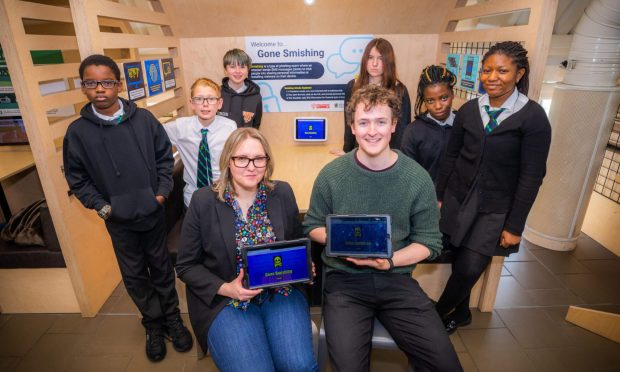A new interactive game developed by a Dundee firm that highlights the risks of mobile phone scams is now available in a city visitor attraction.
The game, Gone Smishing, has been designed by city developers Konglomerate Games in conjunction with Abertay University.
They hope the game will help people to identify phishing emails or SMS messages, known as ‘smishing’.
The messages often attempt to persuade recipients to reveal private or confidential information like passwords or bank details.
The idea to make the game came about after Dr Lynsay Shepherd, senior lecturer in cybersecurity and human-computer interaction at Abertay University, secured a grant from the National Cyber Security Centre.
Konglomerate Games has produced two games to promote phishing education. The first has now been installed within Dundee Science Centre.
Dr Shepherd explained: “When the UK went into lockdown, we all received a text from the government instructing us to stay at home.
“Scammers instantly jumped on it and people started receiving texts asking them to pay a £20 fine for breaking the rules. That was just the start of it.
“There’s been a 600% rise in phishing since the pandemic.
“We’re keen to spread the word about the risks and prevent so many people from falling victim to these scams.”
Dundee games firm’s aim to improve lives
Konglomorate Games was launched by a group of then-Abertay University students in 2019.
Since then, the firm has worked on a range of games, including one to help children with cystic fibrosis.
It has also developed a game that helps detect and diagnose eye conditions.
Chief executive Jamie Bankhead said: “As a company, we focus on improving lives through games.
“We were delighted to work with Abertay University on these new phishing games.
“They will help users identify some of the increasingly sophisticated scamming methods doing the rounds.
“Scammers are getting smarter by the day and often prey on those more likely to succumb, including young people targeted by online offers, fake celebrity social media accounts and competitions.
“But we are all vulnerable to scams, even those who think they’re not.
“By seeing them and perhaps falling victim to them within the game, they can be more vigilant going forward.”
Phone scam games available to play at Dundee Science Centre
The games are now available to play at Dundee Science Centre.
Lorraine Lemon, the centre’s head of business development hopes they will allow young visitors to learn more about phishing scams in an informal setting.
She said: “Children so often learn by doing.
“This is not just an entertaining game but also a realistic way for our visitors to explore scams in a safe, informal space.
“It’s also a great way for parents to start conversations with their children about online safety more generally.
“Like so many things, cyber security is about prevention and awareness.
“I’d urge as many of our visitors to give it a go and contribute to longer-term research to further improve cyber-security.”













